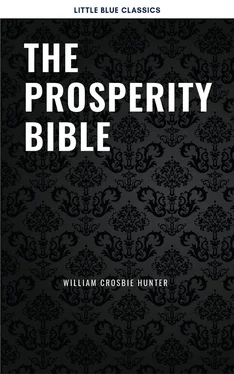This same principle will procure emphasis in a speech. If you have a point that you want to bring home to your audience forcefully, make a sudden and great change of tempo, and they will be powerless to keep from paying attention to that point. Recently the present writer saw a play in which these lines were spoken:
"I don't want you to forget what I said. I want you to remember it the longest day you—I don't care if you've got six guns." The part up to the dash was delivered in a very slow tempo, the remainder was named out at lightning speed, as the character who was spoken to drew a revolver. The effect was so emphatic that the lines are remembered six months afterwards, while most of the play has faded from memory. The student who has powers of observation will see this principle applied by all our best actors in their efforts to get emphasis where emphasis is due. But remember that the emotion in the matter must warrant the intensity in the manner, or the effect will be ridiculous. Too many public speakers are impressive over nothing.
Thought rather than rules must govern you while practising change of pace. It is often a matter of no consequence which part of a sentence is spoken slowly and which is given in fast tempo. The main thing to be desired is the change itself. For example, in the selection, "The Mob," on page 46, note the last paragraph. Reverse the instructions given, delivering everything that is marked for slow tempo, quickly; and everything that is marked for quick tempo, slowly. You will note that the force or meaning of the passage has not been destroyed.
However, many passages cannot be changed to a slow tempo without destroying their force. Instances: The Patrick Henry speech on page 110, and the following passage from Whittier's "Barefoot Boy."
O for boyhood's time of June, crowding years in one brief moon, when all things I heard or saw, me, their master, waited for. I was rich in flowers and trees, humming-birds and honey-bees; for my sport the squirrel played; plied the snouted mole his spade; for my taste the blackberry cone purpled over hedge and stone; laughed the brook for my delight through the day and through the night, whispering at the garden wall, talked with me from fall to fall; mine the sand-rimmed pickerel pond; mine the walnut slopes beyond; mine, an bending orchard trees, apples of Hesperides! Still, as my horizon grew, larger grew my riches, too; all the world I saw or knew seemed a complex Chinese toy, fashioned for a barefoot boy!—J.G. Whittier.
Be careful in regulating your tempo not to get your movement too fast. This is a common fault with amateur speakers. Mrs. Siddons rule was, "Take time." A hundred years ago there was used in medical circles a preparation known as "the shot gun remedy;" it was a mixture of about fifty different ingredients, and was given to the patient in the hope that at least one of them would prove efficacious! That seems a rather poor scheme for medical practice, but it is good to use "shot gun" tempo for most speeches, as it gives a variety. Tempo, like diet, is best when mixed.

QUESTIONS AND EXERCISES
1. Define tempo.
2. What words come from the same root?
3. What is meant by a change of tempo?
4. What effects are gained by it?
5. Name three methods of destroying monotony and gaining force in speaking.
6. Note the changes of tempo in a conversation or speech that you hear. Were they well made? Why? Illustrate.
7. Read selections on pages 34, 35, 36, 37 and 38, paying careful attention to change of tempo.
8. As a rule, excitement, joy, or intense anger take a fast tempo, while sorrow, and sentiments of great dignity or solemnity tend to a slow tempo. Try to deliver Lincoln's Gettysburg speech (page 50), in a fast tempo, or Patrick Henry's speech (page 110), in a slow tempo, and note how ridiculous the effect will be.
Practise the following selections, noting carefully where the tempo may be changed to advantage. Experiment, making numerous changes. Which one do you like best?
DEDICATION OF GETTYSBURG CEMETERY
Fourscore and seven years ago, our fathers brought forth upon this continent a new nation, conceived in liberty and dedicated to the proposition that all men are created equal. Now we are engaged in a great civil war, testing whether that nation—or any nation so conceived and so dedicated—can long endure.
We are met on a great battlefield of that war. We are met to dedicate a portion of it as the final resting-place of those who have given their lives that that nation might live. It is altogether fitting and proper that we should do this.
But, in a larger sense, we cannot dedicate, we cannot consecrate, we cannot hallow, this ground. The brave men, living and dead, who struggled here, have consecrated it, far above our power to add or to detract. The world will very little note nor long remember what we say here; but it can never forget what they did here.
It is for us, the living, rather, to be dedicated here to the unfinished work they have thus far so nobly carried on. It is rather for us to be here dedicated to the great task remaining before us: that from these honored dead we take increased devotion to that cause for which they here gave the last full measure of devotion; that we here highly resolve that these dead shall not have died in vain; that the nation shall, under God, have a new birth of freedom, and that government of the people, by the people, for the people, shall not perish from the earth.
–Abraham Lincoln.
A PLEA FOR CUBA
[This deliberative oration was delivered by Senator Thurston in the United States Senate on March 24, 1898. It is recorded in full in the Congressional Record of that date. Mrs. Thurston died in Cuba. As a dying request she urged her husband, who was investigating affairs in the island, to do his utmost to induce the United States to intervene—hence this oration.]
Mr. President, I am here by command of silent lips to speak once and for all upon the Cuban situation. I shall endeavor to be honest, conservative, and just. I have no purpose to stir the public passion to any action not necessary and imperative to meet the duties and necessities of American responsibility, Christian humanity, and national honor. I would shirk this task if I could, but I dare not. I cannot satisfy my conscience except by speaking, and speaking now.
I went to Cuba firmly believing that the condition of affairs there had been greatly exaggerated by the press, and my own efforts were directed in the first instance to the attempted exposure of these supposed exaggerations. There has undoubtedly been much sensationalism in the journalism of the time, but as to the condition of affairs in Cuba, there has been no exaggeration, because exaggeration has been impossible.
Under the inhuman policy of Weyler not less than four hundred thousand self-supporting, simple, peaceable, defenseless country people were driven from their homes in the agricultural portions of the Spanish provinces to the cities, and imprisoned upon the barren waste outside the residence portions of these cities and within the lines of intrenchment established a little way beyond. Their humble homes were burned, their fields laid waste, their implements of husbandry destroyed, their live stock and food supplies for the most part confiscated. Most of the people were old men, women, and children. They were thus placed in hopeless imprisonment, without shelter or food. There was no work for them in the cities to which they were driven. They were left with nothing to depend upon except the scanty charity of the inhabitants of the cities and with slow starvation their inevitable fate… .
Читать дальше













